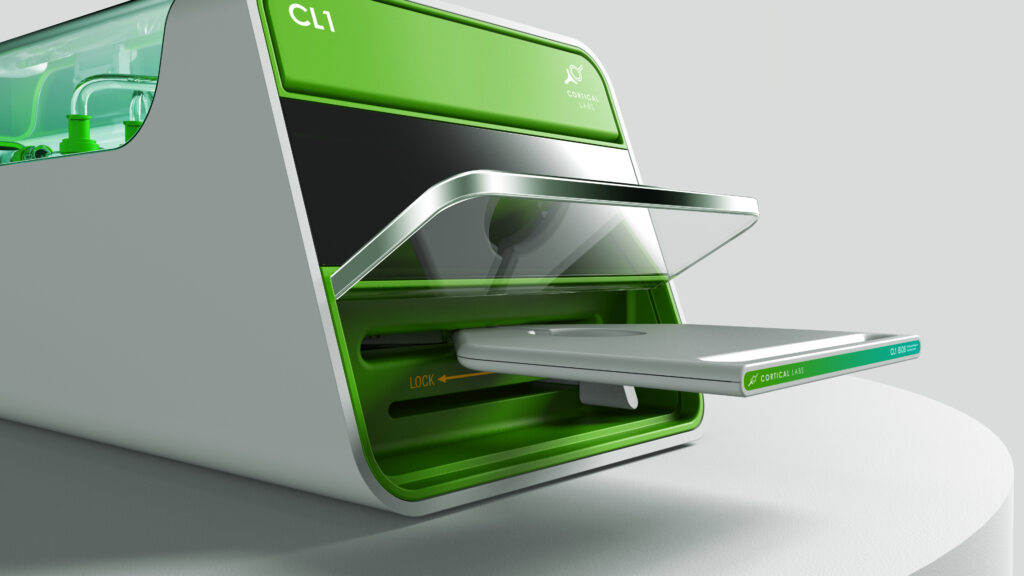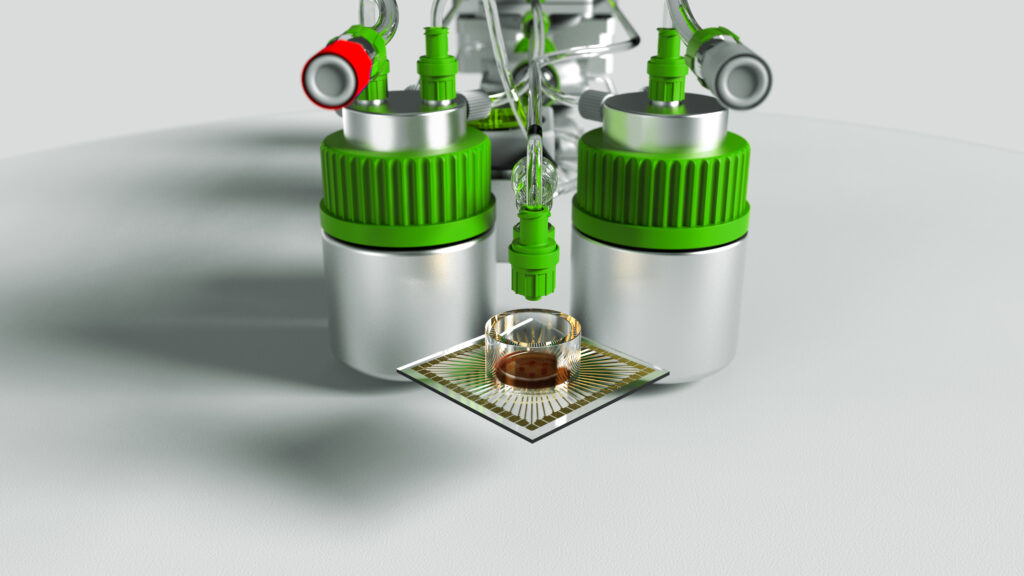Cortical Labs Raises $15M to Scale Up BiOS, an Organic-Digital Intelligence System
By Samuel Wines
‘Life is the most powerful technology we know of, and the amazing thing is it’s a technology that has been completely unexplored. Biology is essentially the study of how nature computes. We need to reverse-engineer the biosphere and then determine how to repurpose biology to compute and build globally. In biology, you’re dealing with systems that are far away from equilibrium and undergoing constant change, even at the level of the DNA.’ – Freeman Dyson

Front and centre, renders of the Cortical Labs BiOS unit in all its glory.
The Dawn of Biocomputing
In an era dominated by tech giants like Google, Microsoft, and OpenAI, Cortical Labs, an Australian start-up, integrates synthetic biology and human neurons, taking a tangential pathway compared to conventional approaches to Artificial Intelligence (AI). This trailblazing endeavour, known as Synthetic Biological Intelligence (SBI), leverages clusters of human neurons cultivated in labs from stem cells, thereby introducing the potential of biocomputers capable of revolutionising the realm of AI.

The return of the floppy disk: making the old-school the new-school
Crafting the DishBrain
Their unprecedented achievement is the creation of a ‘DishBrain,’ a fusion of lab-grown human neurons and silicon, forming a Biological Intelligence Operating System, a.k.a biOS for short, which I think is a super sexy acronym. The core backbone of this emerging technology is the energy efficiency and adaptive, self-programming capacities of human neurons. This unique approach has turned some serious heads in VC land, with Cortical Labs having amassed $15.1 million ($10 million USD) in funding from around the globe, with notable backers like Horizons Ventures, LifeX Ventures and Australia’s very own Blackbird Ventures. The team is steadfast in its belief that its BiOS, powered by OI, can outperform traditional digital AI models in terms of general intelligence. CEO Hon Weng Chong views this unique amalgamation of AI and synthetic biology as a gateway to limitless opportunities ranging from personalised medicinal advances to enhanced disease detection capabilities through to alleviating the need for animal testing altogether.

Where the magic happens, where silicone meets synapse, where the biological becomes technological
Harnessing the Power of Neurons
The ingenuity and revolutionary potential of Cortical Labs’ approach were underlined in a study published in the scientific journal Neuron. In a remarkable demonstration, neurons in a petri dish were trained to play the computer game Pong, underscoring the potential to establish and evaluate new drugs and therapies. Highlighting the prospects of personalised drug discovery, Weng Chong noted the possibility of deriving neurons from an individual’s blood, thereby facilitating tailored results. This early-stage yet groundbreaking technology carries immense promise with the ability to offer more rapid learning and reduced energy consumption than current AI systems.
Beyond Drug Discovery
The potential applications of SBI extend beyond drug discovery and into the domains of dementia and cognitive research. The experimental usage of neurons’ ability to play Pong as a cognitive assay enables the comprehension of novel drugs’ effectiveness and cognitive implications. Furthermore, this technology could augment quantum computing and generative AI for testing compounds, which is freakin insane when you think about it. The long-term vision of Cortical Labs is to harness the innate intelligence found in biological systems leveraging these capabilities to build more complex devices that is not possible to do with silicone alone.
Revolutionising AI Through Biology
As the technology develops, Cortical Labs is poised to revolutionise personalised medicine, disease detection, and drug discovery, in addition to manifesting superior learning capabilities and energy efficiency. Although it may not quite be the transhumanist dream of the tech-mediated singularity, or ‘Omega Point’ as referred to by the enigmatic Teilhard de Chardin. It is crucial to note that the merging of biology and AI still symbolises a paradigm shift in the development of AI. As British computer scientist, Professor Steve Furber, aptly said, ‘If you take the most sophisticated machine we know about, which is the brain, and compare it to modern silicon, it’s a very poor match.’
A New Era of Computing
This pioneering work of Cortical Labs could represent the emergence of a new era in computing. The integration of biology and technology promises to deliver intelligent machines that outstrip the capabilities of their traditional electronic counterparts while operating with unparalleled energy efficiency. In the convergence of these two disparate fields lies the future of computing. The path ahead promises unprecedented advancements capable of reshaping various industries and propelling us into new frontiers of scientific exploration. The possibilities for Biointelligence are just beginning to be explored, but the prospects are limitless. As the biological revolution dawns, it holds the promise of a new epoch of intelligent machines that far outstrip the capabilities of conventional electronic systems.

The ultimate biocomputer server rack doesn’t exi…
The Ethics of Biocomputing
While Cortical Labs’ foray into the intersection of biology and AI symbolises a new frontier in the tech world, it is essential to approach this evolving domain with caution. The potential manipulation of human neurons sparks biosecurity, privacy, and ethical concerns. Dual-use issues, regulatory challenges, and the prospect of unforeseen consequences also underline the need to thoroughly examine the potential first, second and nth-order effects of such technological advancement, which would require robust oversight. As we begin to collaborate with living systems to revolutionise computing, the wisdom of Michael Crichton’s words ring true, we must remember, ‘Life will find a way,’ and proceed with a keen awareness of the potential risks involved. After all, it’s our responsibility to ensure that the path it paves leads to a future that benefits humanity and the planet as a whole.
Luckily, the Cortical crew are very aware of the ethical implications of their technology and are working with multiple independent bioethicists to ensure that they have as wide a boundary thinking as possible on the matter, with two papers in the process of being published on the topic. Brett, the CSO at Cortical Labs, has been kind enough to share these papers with us, which can both be accessed below:
Still Curious?
- Lab Grown Brain Cells Play Pong – BBC
- Neurons in a dish learn to play Pong – what’s next? – Nature (Paywall)
- Technology is not values neutral – Consilience Project
- DishBrain creator Cortical Labs banks $15m – AFR
- Cortical Labs Raises $10M for its Pong-playing stem cells, which could eventually power AI – TechCrunch